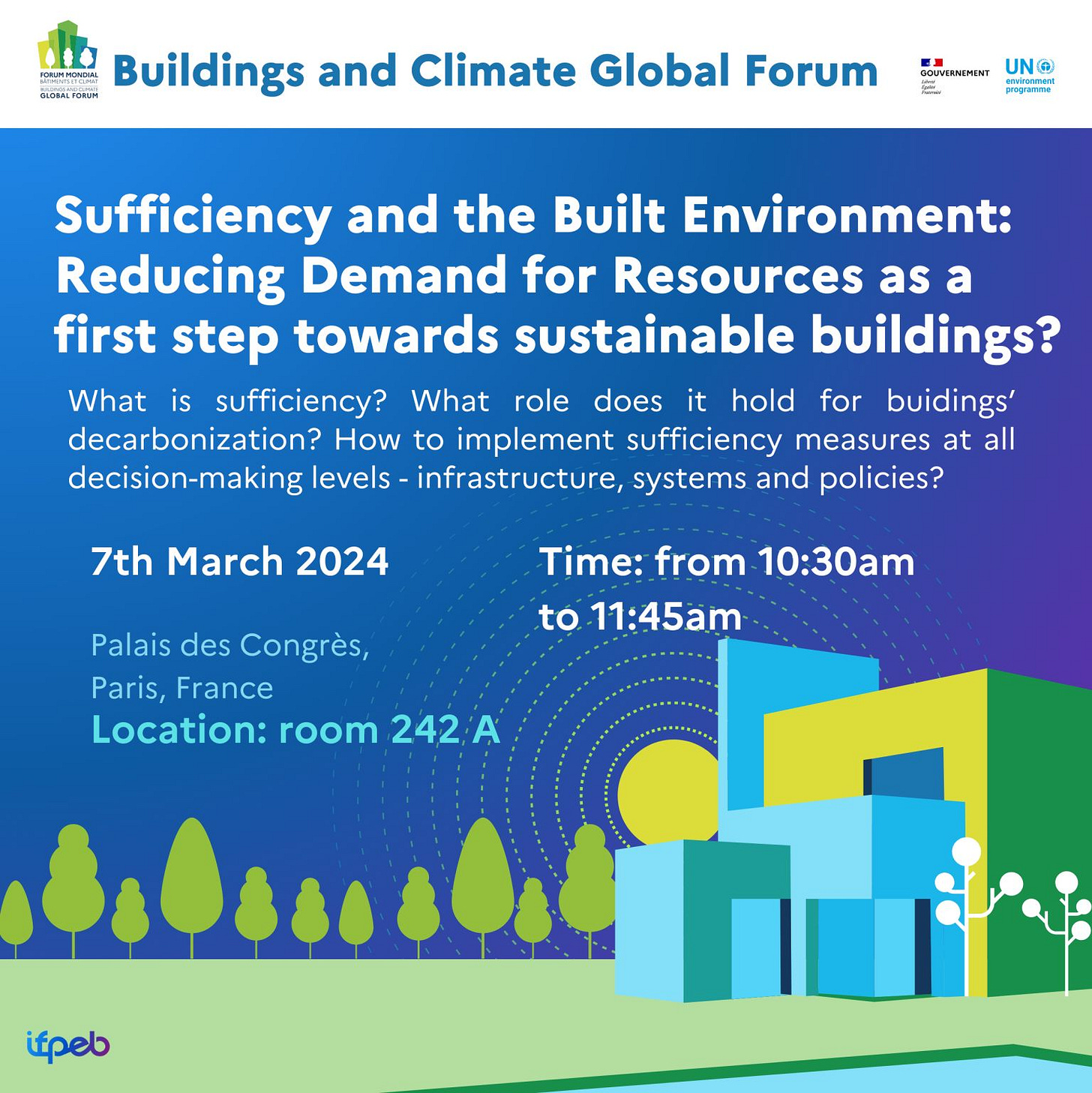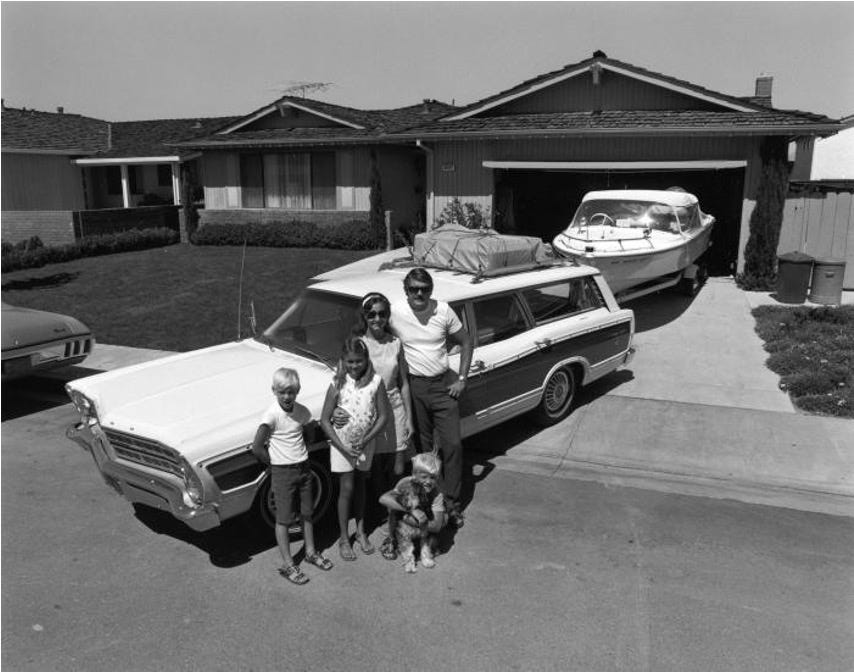Enough already: why we need sufficiency as well as efficiency
And a note about the next month
So I was honoured and thrilled to be invited to speak at the International Passive House conference at the beginning of April. Then I was thrilled and honoured to speak at a climate and building conference about sufficiency in Paris on March 7, organized by the French government and the United Nations. It’s crazy, going to Paris for a 75 minute round table, and there was no way that I was going to do two return flights in a month (one is bad enough) so I am going to camp out in London between the two conferences.
I plan to keep my commitment of at least two posts a week and will try to maintain three, which shouldn’t be hard; I will be meeting such interesting people and going to interesting places.
I also thought it might be an opportunity to give a little bonus to my paid subscribers: shorter, travel-related posts rather than my usual 800 word essays. While it would be lovely to convert a few more subscribers to paid, I think of it more as a thank you to those who already have. For those who can’t afford to support yet another substack (these get expensive!) follow me on Instagram where I will be doing abbreviated versions. Or you can press the button:
Here’s why I am so excited:
When I wrote my first book, Living the 1.5 Degree Lifestyle, I concluded that the only way we would ever get close to it is to use less stuff and to keep it longer, a lifestyle based on sufficiency, or as the subtitle of my new book says, “a life of just enough.”
But we don’t live lives of just enough, we do the opposite and live lives of wanting more. So if the 60s dream was a big house, car and boat,
The 2020s dream is a bigger house, a bigger car, and a bigger boat. That giant Ford truck probably gets more miles per gallon than the 60s station wagon, which is why philosopher Samuel Alexander says “efficiency without sufficiency is lost.”
The reality of trying to live a 1.5 degree lifestyle was that I couldn’t drive any kind of car; if you count the upfront carbon emitted making it, my emissions were still too high. Fortunately, I could ride an e-bike; it was sufficient for me when I lived in a city where most of what I need was in biking distance. Understanding the impact of those upfront carbon emissions is what led to my new book, and what I am talking about in Paris. Here is an excerpt from the book where I try to explain it all:
We are living in marvellous times. Wind turbines and solar panels have made renewable electricity cheaper than any other kind. We can heat and cool with heat pumps and cook with magnetism and we really don’t have to burn stuff anymore. With Passivhaus designs becoming more common and affordable, we won’t need much heating or cooling in the first place. Electric cars are dropping in price and will soon make gasoline-powered cars functionally obsolete. Everything is becoming so damned efficient. But as Samuel Alexander noted in his Critique of Techno-Optimism, efficiency without sufficiency is lost.
In order to take advantage of efficiency gains—that is, in order for efficiency gains to actually reduce resource and energy consumption to sustainable levels—what is needed is an economics of sufficiency; an economics that directs efficiency gains into reducing ecological impacts rather than increasing material growth.
Ecological limits mean more than just carbon. We know how to make aluminum without carbon emissions, but we are still digging up bauxite by the boatload. We can build towers out of wood, but we also need forests for biodiversity. So even as what we build gets more efficient and the upfront carbon emissions of our materials are reduced, we still need to use less of them.
Many have been writing about the need for increasing energy efficiency and switching to renewable resources, but Yamina Saheb of Lausanne University, [who is kicking off the Paris conference,] defines sufficiency:
Sufficiency is a set of policy measures and daily practices which avoid the demand for energy, materials, land, water, and other natural resources, while delivering wellbeing for all within planetary boundaries. Sufficiency bridges the inequality gap by setting clear consumption limits to ensure a fair access to space and resources.
Saheb is primarily addressing buildings, but also notes that the concept of sufficiency goes well beyond that, setting a lower limit of sufficiency that provides a decent standard of living, which is “a set of essential material preconditions for human wellbeing which includes housing, nutrition, basic amenities, health care, transportation, information, education, and public space.”
With buildings, Saheb calls for optimizing their use, repurposing existing buildings, prioritizing multifamily dwellings, and “adjusting the size of buildings to the evolving needs of households by downsizing dwellings.”
But housing doesn’t exist in a vacuum. What we build is a function of how we get around, or as transportation planner Jarrett Walker noted, transportation and land use are the same things spoken in two different languages. How we live, shop, work, and get between everything must be examined through the lens of sufficiency.
Samuel Alexander took a shot at this in another essay from 2012, “The Sufficiency Economy: Envisioning a Prosperous Descent,” in which he suggests how we might live in a world where everyone has enough but no more than they need. He defines it:
The fundamental aim of a sufficiency economy, as I define it, is to create an economy that provides “enough, for everyone, forever.” In other words, economies should seek to universalize a material standard of living that is sufficient for a good life but which is ecologically sustainable into the deep future.
This is why I am going to Paris, to be part of this discussion, which no doubt will be seen by some as a UN plot to make everyone bike to their tiny apartments in their 15-minute city. I will report on it all next week.








I’m laughing at this all. Great entertainment for a Friday after a long, exhausting workweek.
“But we don’t live lives of just enough, we do the opposite and live lives of wanting more.” That IS the human condition, though. It doesn’t matter what a person’s ethnicity, nationality, race, religion, sex, gender, socioeconomic status, or other criteria you want to use, we all want more over time. In other words, what’s “just enough” for one person is woefully inadequate for another, and simultaneously more than imaginable for yet another. THERE IS NO ONE UNIVERSAL STANDARD OF SUFFICIENCY FOR ALL HUMANS ACROSS THE WORLD. Stop trying to pretend that there is one and that we all must adapt to it.
I’m also laughing at how willingly Lloyd is to jump into an airplane and fly across the ocean to attend not one but TWO conferences on sustainability and sufficiency when he did the same thing not too long ago as part of another round table discussion panel. And that’s very telling because you have some climate change pundits out there arguing NO ONE should be allowed to fly more than four times in an *ENTIRE* lifetime … but if it’s for a “good cause” of promoting sustainability and sufficiency, do all of those carbon emissions suddenly cancel out someone else’s family vacation to the Canary Islands? Or maybe they have a lesser carbon intensity because the guilt of contributing to climate change is excusable when sharing the message of “only what’s needed and nothing more”?
Lloyd , you DO realize I’m taking the mickey out of this bullshit argument, I hope, because it has no fundamental meaning or value. The Nazis gave POW’s and Holocaust prisoners “just what they needed” to survive, “AND NOTHING MORE.” That’s ultimately the foundational truth that's being pushed by Klaus Schwab, the WEF, Leonardo DiCaprio, you, and all the other tree-hugging eco-warriors, whether or not they’re willing to admit it to the gullible readers of this substack—that YOU as the reader is a scourge to the planet and YOU must be eliminated, especially if you’re unwilling to drastically reduce your carbon footprint, while THEY continue to live their lives unimpeded by the decrees they demand YOU abide by.
Have a wonderful flight and vacation in London, Lloyd. I suggest you do the curious tourist thing and see as much of the city as you can, especially the museums, monuments, and bookstores. I’ll be enjoying my time here in Phoenix, living my best life.
Sign me up! UN plot and all. Safe travels.